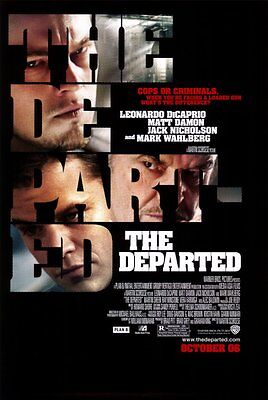
The Departed
The Departed: A Symphony of Swearing, Rats, and Deception
Few films manage to be both a masterclass in tension and a glorious showcase of creative profanity quite like Martin Scorsese’s The Departed (2006). This is the movie that finally netted Scorsese his long-overdue Oscar for Best Director, and boy, did he earn it. Packed to the brim with double-crosses, brutal executions, and enough Boston accents to make Ben Affleck cry tears of joy, The Departed is a pulse-pounding, white-knuckle thrill ride wrapped in a crime drama.
The Plot: Two Rats in a Maze (With Guns)
At its core, The Departed is a game of cat and mouse—except both the cat and the mouse are undercover, armed, and swearing so much that even Samuel L. Jackson might ask them to take it down a notch. Set in the crime-ridden underbelly of Boston, the film pits two men against each other: Billy Costigan (Leonardo DiCaprio), an undercover cop infiltrating the Irish mob, and Colin Sullivan (Matt Damon), a mole embedded within the Massachusetts State Police, feeding intel to the very criminals they’re trying to catch.
Both men are playing the long con, leading double lives so intensely stressful that you can practically hear their therapists drafting resignation letters. Their target (and, in Sullivan’s case, employer) is the delightfully unhinged mob boss Frank Costello, played by Jack Nicholson, who delivers one of the most gloriously unhinged performances of his career. Costello is a crude, ruthless, scenery-chewing villain who operates with a complete disregard for rules, human life, and good table manners.
As the film progresses, both Costigan and Sullivan are tasked with unmasking each other while simultaneously keeping their own covers intact. It’s like a chess game where all the pieces are armed and have serious anger management issues. The tension tightens like a noose as their respective worlds start to crumble, culminating in a series of shocking, rapid-fire deaths that leave audiences slack-jawed and questioning their faith in happy endings.
The Characters: Boston’s Most Stressed-Out Residents
Leonardo DiCaprio’s Billy Costigan is a man perpetually teetering on the edge of a full-blown breakdown. Posing as a thug to earn the trust of Costello’s crew, Billy is wracked with anxiety and desperation, which DiCaprio plays with a level of intensity that makes you want to hand him a stress ball and a warm cup of tea. His polar opposite is Matt Damon’s Colin Sullivan, the smug and self-assured golden boy whose ability to lie straight to everyone’s face would make him a great politician if he weren’t already a criminal.
And then there’s Mark Wahlberg as Sergeant Dignam, a walking, talking Boston stereotype who has exactly one mode: insult. Wahlberg steals every scene he’s in, hurling relentless barbs with the precision of a seasoned stand-up comedian. If sarcasm were an Olympic sport, Dignam would have more gold medals than Michael Phelps.
Jack Nicholson’s Costello, meanwhile, is a pure force of chaos. Whether he’s executing rivals, smearing blood on someone’s face, or casually tossing racial slurs like candy, he is absolutely unhinged in a way that only Nicholson can pull off. His over-the-top performance is perfectly counterbalanced by Martin Sheen’s weary, noble Captain Queenan, the one moral compass in a sea of corruption. And we can’t forget Vera Farmiga as Madolyn, the psychiatrist caught between the two men, whose romantic entanglements only add more fuel to this already blazing dumpster fire of deceit.
The Departed’s Greatest Strength: Relentless Tension (and Swearing)
What makes The Departed so damn good is its ability to maintain tension so tight it could snap at any moment. Scorsese expertly juggles multiple storylines, ensuring that every scene propels the plot forward, whether through heart-pounding action or razor-sharp dialogue. Every character is living on borrowed time, and the audience can feel it.
The cinematography captures Boston’s gritty underworld beautifully, and the soundtrack is pure gold, from The Rolling Stones’ “Gimme Shelter” (because it’s not a Scorsese film without it) to the ever-present, bagpipe-infused “I’m Shipping Up to Boston” by the Dropkick Murphys, which somehow makes even the simplest walking scene feel like an impending bar fight.
The Twist (Or: Everyone Dies, and Then Everyone Dies Again)
By the film’s third act, the tension reaches unbearable levels. After Queenan meets an unfortunate end via a multi-story drop, Costigan’s cover is hanging by a thread, and Sullivan’s secret is on the verge of exposure. What follows is one of the most jaw-dropping, kill-‘em-all sequences in recent cinematic history. In a matter of minutes, nearly every major character is executed in rapid succession. It’s brutal, it’s shocking, and it’s an audaciously bold move that leaves audiences gasping for air.
And just when you think the carnage is over, Wahlberg’s Dignam (having vanished for a suspiciously long stretch) waltzes back in for the final act of vengeance, executing Sullivan in his own apartment. It’s the cherry on top of this blood-soaked sundae, leaving the audience with a darkly satisfying sense of justice.
Final Thoughts: A Crime Epic for the Ages (and the Foul-Mouthed)
The Departed isn’t just a great crime film; it’s a masterclass in storytelling, tension, and, let’s be honest, creative swearing. It’s got all the hallmarks of a Scorsese classic—moral ambiguity, intense performances, stunning cinematography, and a whole lot of “f***s.”
It’s no wonder the Academy finally handed Scorsese that golden statue—he took a Hong Kong crime thriller (Infernal Affairs) and transformed it into an American classic that stands shoulder to shoulder with the greats. It’s a movie that doesn’t just keep you on the edge of your seat; it kicks the seat out from under you and leaves you lying on the floor, wondering what the hell just happened.
A masterpiece of deception, betrayal, and poetic justice, The Departed is the crime thriller that never lets up—and neither does its body count.